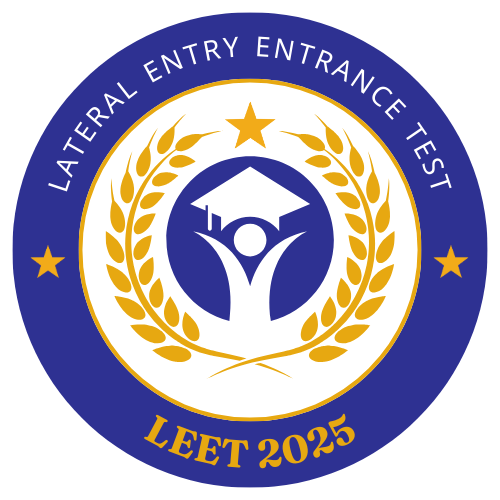Announcement
Know What to Study: LEET 2026 Syllabus Explained
Download & Apply LEET 2026 Inquiry
Download Latest LEET Syllabus PDF
Download Your Ultimate LEET Syllabus
- Mathematics – The Foundation of Engineering
Mathematics is a crucial part of haryana LEET exam syllabus as it forms the backbone of engineering concepts.
Key topics include:
- Algebra – Matrices, Determinants, Binomial Theorem
- Calculus – Differentiation, Integration, Partial Derivatives
- Trigonometry – Identities, Heights & Distances
- Probability & Statistics – Mean, Median, Standard Deviation
- Differential Equations – Ordinary & Partial Equations
- Vector Algebra – Dot & Cross Product, Gradient, Divergence
📌 Important Exams Covering This Section: Haryana LEET, Karnataka DCET, JELET, UPSEE LEET, IPU CET LEET.
- Engineering Mechanics – Strength & Motion
Understanding the physical principles behind structures and machines is essential. Topics include:
- Statics – Force, Moments, Equilibrium
- Dynamics – Newton’s Laws, Work-Energy Theorem
- Strength of Materials – Stress, Strain, Bending Moments
- Fluid Mechanics – Bernoulli’s Theorem, Buoyancy
📌 Common in: Karnataka DCET, Odisha DET, Kerala LET, Assam PAT, IPU CET LEET.
- Physics – The Science of Engineering
Physics helps understand the real-world application of engineering. Key areas include:
- Mechanics – Kinematics, Newton’s Laws
- Thermodynamics – Laws of Thermodynamics, Heat Transfer
- Electricity & Magnetism – AC/DC Circuits, Electrostatics
- Optics – Reflection, Refraction, Lens Formulas
- Modern Physics – Semiconductor Theory, Dual Nature of Matter
📌 Key Exams: WB JELET, UPSEE LEET, Maharashtra DSE, SRM Lateral Entry.
- Chemistry – The Molecular Side of Engineering
Though not a major part of LEET exams, basic chemistry knowledge is required in some tests. Topics include:
- Organic Chemistry – Hydrocarbons, Polymers
- Inorganic Chemistry – Periodic Table, Coordination Compounds
- Physical Chemistry – Electrochemistry, Chemical Equilibrium
📌 Covered in: Assam PAT, Odisha DET, UPSEE LEET.
- Computer Awareness – The Digital World
With the rise of technology, LEET exams also test basic computing knowledge. Topics include:
- Programming – C, C++, Java (Basics)
- Operating Systems – Windows, Linux
- Data Structures – Arrays, Linked Lists, Trees
- Networking – IP Addressing, Network Topologies
- Databases – SQL Queries, DBMS Concepts
📌 Important for: IPU CET LEET, VIT Lateral Entry, LPU LEET, Amity Lateral Entry.
- Engineering Drawing – The Language of Engineers
Some LEET exams include engineering drawing to test visualization skills. Topics include:
- Orthographic & Isometric Projection
- Sectional Views
- Dimensioning & Tolerance
- CAD Basics
📌 Common in: Odisha DET, Punjab PET, Maharashtra DSE.
- Domain-Specific Subjects – Diploma Specialization Topics
haryana LEET exam syllabus also test branch-specific subjects based on the candidate’s diploma. Examples include:
- Mechanical Engineering: Fluid Mechanics, Machine Design
- Electrical Engineering: Circuit Theory, Power Systems
- Civil Engineering: Structural Analysis, Surveying
- Computer Science: Programming, Database Management
- Electronics: Digital Logic, Microprocessors
📌 Relevant for: Kerala LET, Karnataka DCET, Punjab PET, SRM Lateral Entry.
- Final Preparation Tips
- Prioritize Key Subjects: Focus on Mathematics, Engineering Mechanics, and Physics, as they appear in most exams.
- Solve Previous Papers: Practice past-year papers to understand question patterns.
- Use Standard Books: NCERT, R.S. Aggarwal (Maths), and technical books for diploma subjects.
- Time Management: Allocate time wisely for each section during preparation.
- Mock Tests: Take online mock tests to improve speed and accuracy.
